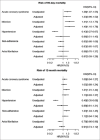Precipitating Factors Leading to Hospitalization and Mortality in Heart Failure Patients: Findings from Gulf CARE
- PMID: 35330660
- PMCID: PMC8939375
- DOI: 10.4103/HEARTVIEWS.HEARTVIEWS_32_21
Precipitating Factors Leading to Hospitalization and Mortality in Heart Failure Patients: Findings from Gulf CARE
Abstract
Aim: To investigate the precipitating factors that contribute to hospitalization and mortality in postacute heart failure (AHF) hospitalization in the Middle-East region.
Methods: We evaluated patient data from the Gulf AHF registry (Gulf CARE), a prospective multicenter study conducted on hospitalized AHF patients in 47 hospitals across seven Middle Eastern Gulf countries in 2012. We performed analysis by adjusting confounders to identify important precipitating factors contributing to rehospitalization and 90- to 120-day follow-up mortality.
Results: The mean age of the cohort (n = 5005) was 59.3 ± 14.9 years. Acute coronary syndrome (ACS) (27.2%), nonadherence to diet (19.2%), and infection (14.6%) were the most common precipitating factors identified. After adjusting for confounders, patients with AHF precipitated by infection (hazard ratio [HR], 1.40; 95% confidence interval [CI] 1.10-1.78) and ACS (HR-1.23; 95% CI: 0.99-1.52) at admission showed a higher 90-day mortality. Similarly, AHF precipitated by infection (HR-1.13; 95% CI: 0.93-1.37), and nonadherence to diet and medication (HR-1.12; 95% CI: 0.94-1.34) during hospitalization showed a persistently higher risk of 12-month mortality compared with AHF patients without identified precipitants.
Conclusion: Precipitating factors such as ACS, nonadherence to diet, and medication were frequently identified as factors that influenced frequent hospitalization and mortality. Hence, early detection, management, and monitoring of these prognostic factors in-hospital and postdischarge should be prioritized in optimizing the management of HF in the Gulf region.
Keywords: Acute heart failure; Gulf acute heart failure registry (Gulf CARE); mortality; precipitating factors; readmission; risk factors.
Copyright: © 2022 Heart Views.
Conflict of interest statement
There are no conflicts of interest.
Figures
Similar articles
-
Precipitating factors and 90-day outcome of acute heart failure: a report from the intercontinental GREAT registry.Eur J Heart Fail. 2017 Feb;19(2):201-208. doi: 10.1002/ejhf.682. Epub 2016 Oct 28. Eur J Heart Fail. 2017. PMID: 27790819
-
Precipitating Factors for Hospitalization with Heart Failure: Prevalence and Clinical Impact Observations from the Gulf CARE (Gulf aCute heArt failuRe rEgistry).Med Princ Pract. 2020;29(3):270-278. doi: 10.1159/000503334. Epub 2019 Sep 16. Med Princ Pract. 2020. PMID: 31522185 Free PMC article.
-
The predictive value of precipitating factors on clinical outcomes in hospitalized patients with decompensated heart failure: insights from the Egyptian cohort in the European Society of Cardiology Heart Failure long-term registry.Egypt Heart J. 2023 Mar 8;75(1):16. doi: 10.1186/s43044-023-00342-9. Egypt Heart J. 2023. PMID: 36884155 Free PMC article.
-
Regional differences in precipitating factors of hospitalization for acute heart failure: insights from the REPORT-HF registry.Eur J Heart Fail. 2022 Apr;24(4):645-652. doi: 10.1002/ejhf.2431. Epub 2022 Feb 17. Eur J Heart Fail. 2022. PMID: 35064730 Free PMC article.
-
[Precipitating factors in acute heart failure: a review].Emergencias. 2017 Jun;29(3):185-193. Emergencias. 2017. PMID: 28825240 Review. Spanish.
Cited by
-
Factors associated with medication non-adherence among patients with heart failure.Rev Lat Am Enfermagem. 2024 Aug 30;32:e4302. doi: 10.1590/1518-8345.6756.4302. eCollection 2024. Rev Lat Am Enfermagem. 2024. PMID: 39230133 Free PMC article.
-
The Pattern of Cardiac Disease Admissions and Outcomes among Medical Admissions in St. Paul Hospital Millennium Medical College: A Retrospective Study.Niger Med J. 2023 May 11;64(2):183-195. eCollection 2023 Mar-Apr. Niger Med J. 2023. PMID: 38898966 Free PMC article.
References
-
- Fonarow GC, Abraham WT, Albert NM, Stough WG, Gheorghiade M, Greenberg BH, et al. Factors identified as precipitating hospital admissions for heart failure and clinical outcomes: Findings from OPTIMIZE-HF. Arch Intern Med. 2008;168:847–54. - PubMed
-
- Adams KF, Jr, Fonarow GC, Emerman CL, LeJemtel TH, Costanzo MR, Abraham WT, et al. Characteristics and outcomes of patients hospitalized for heart failure in the United States: Rationale, design, and preliminary observations from the first 100,000 cases in the Acute Decompensated Heart Failure National Registry (ADHERE) Am Heart J. 2005;149:209–16. - PubMed
-
- O’Connor CM, Stough WG, Gallup DS, Hasselblad V, Gheorghiade M. Demographics, clinical characteristics, and outcomes of patients hospitalized for decompensated heart failure: Observations from the IMPACT-HF registry. J Card Fail. 2005;11:200–5. - PubMed
-
- Ambrosy AP, Fonarow GC, Butler J, Chioncel O, Greene SJ, Vaduganathan M, et al. The global health and economic burden of hospitalizations for heart failure: Lessons learned from hospitalized heart failure registries. J Am Coll Cardiol. 2014;63:1123–33. - PubMed
-
- Crespo-Leiro MG, Anker SD, Maggioni AP, Coats AJ, Filippatos G, Ruschitzka F, et al. European Society of Cardiology Heart Failure Long-Term Registry (ESC-HF-LT): 1-year follow-up outcomes and differences across regions. Eur J Heart Fail. 2016;18:613–25. - PubMed
LinkOut - more resources
Full Text Sources
Research Materials
Miscellaneous

